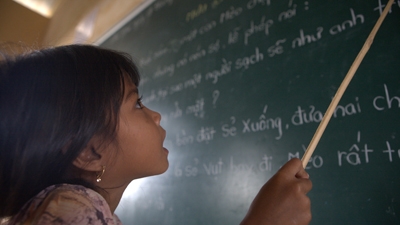Hanoi, April 25, 2012 - The Vietnam High Quality Education For All Report provides an in-depth analysis into Vietnam’s primary and secondary education performance.
The report, a joint product of the World Bank, UK Department for International Development and Belgium Development Cooperation, offers an analysis of educational performance over time (1992-2008) and the drivers of change to inform the next decade of policy reforms in Vietnam.
“This study comes at a timely moment to feed into the implementation of the Socio-Economic Development Strategy 2011-2020 and the Education Strategic Development Plan 2011-2020 of Vietnam. Both emphasize the need for quality education for all to enhance productivity, growth and social development.” said Keiko Sato, the World Bank Vietnam Portfolio and Operations Manager. “In fact, the development of human resources is one of the three breakthrough areas of the SEDS and this work can inform Vietnam's efforts in this area.”
The report shows that Vietnam has made impressive gains in improving educational performance over a relatively short period of time. Vietnam’s literacy rate and school attendance rate compare favorably to other countries in the region and in the same income group.
However, the report also recognizes that the country still faces challenges in closing gaps in access and learning across population groups, and in improving the quality of teaching and learning to develop the skills needed for the labor market.
To address those challenges, Vietnam should better prioritize public funding in the education sector, improve spending efficiency and improve school management and pedagogy. “This reform agenda is critical to meet the public demand for a higher performing education system and build sustainable foundation for human development in middle-income Vietnam,” said Emanuela di Gropello, Lead Author of the report, Lead Economist, Human Development Unit, East Asian Region, The World Bank.

